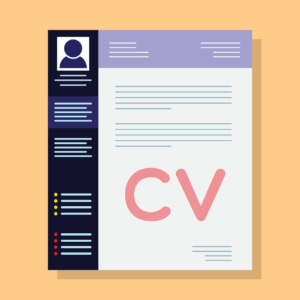When you’re hunting for jobs, you’ve probably bumped into the terms CV and resume. But what exactly do they mean, and how are they different? It’s important to know the distinction between a CV and a resume when you’re dealing with job applications. Although both try to show a person’s work history, they’re not the same.
CV (Curriculum Vitae)
A CV is like your professional life story. It’s a detailed document that covers your entire career, from the first job you ever had to the latest skills you’ve acquired. A CV is more common in academic and research fields or when applying for jobs internationally. Here’s what you might find in a CV:
-
Personal Information: Name, contact details, and maybe a professional summary.
-
Education: Details about your academic journey, including degrees, institutions, and dates. For each academic entry, you should include the specific degree earned (e.g., Bachelor of Science), the name of the institution (e.g., XYZ University), and the duration of your academic tenure, specifying the start and end dates or graduation date.
-
Work Experience: A comprehensive list of all your work experiences, including responsibilities and achievements.
-
Skills: An exhaustive list of your skills, from language proficiency to technical abilities and other strengths that set you apart.
-
Publications/Presentations: For academics, any research papers, publications, or presentations you’ve been a part of.
-
Professional Memberships: If you’re part of any professional organizations. These memberships showcase your commitment to ongoing learning and networking within your industry.

Resume
Think of a resume as the highlight reel of your career. It’s shorter and tailored to the specific job you’re applying for. Here’s what you might include in a resume:
-
Contact Information: Name, phone number, email, and maybe a LinkedIn profile.
-
Professional Summary or Objective: This is brief statement about your career goals and what you bring to the table. It sets the tone for the rest of the resume, acting as an introduction with the primary goal of capturing the reader’s attention and conveying why you are a strong candidate for the job.
-
Work Experience: Focus on the most relevant experiences for the job you want, highlighting achievements and skills.
-
Education: Similar to the CV but condensed to emphasize relevance.
-
Skills: A concise list of skills directly related to the job.
-
Certifications or Awards: Mention relevant certifications or notable achievements.
Difference Between a CV and a Resume
-
Length: CVs are longer, often several pages, while resumes are typically one to two pages. Resumes focus on presenting the most relevant information.
-
Purpose: CVs provide an overview of your entire career, while resumes are tailored for specific job applications. They are crafted to be tailored documents and the purpose of a resume is to quickly capture the attention of employers.
-
Content: CVs include everything, while resumes emphasize the most relevant information for a particular job. Resumes are tailored to showcase experiences, skills, and qualifications directly related to the position you’re applying for.
Summarily, while a CV tells the whole story of your professional life, a resume is a focused snapshot crafted for a specific job. Getting the hang of when to pick one over the other helps you tell your professional story in the best way possible.











